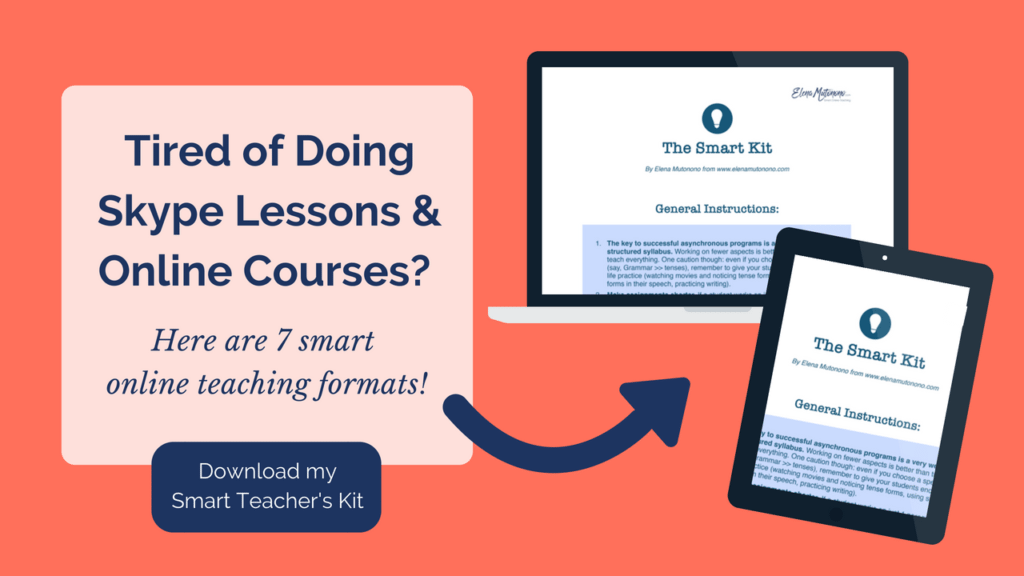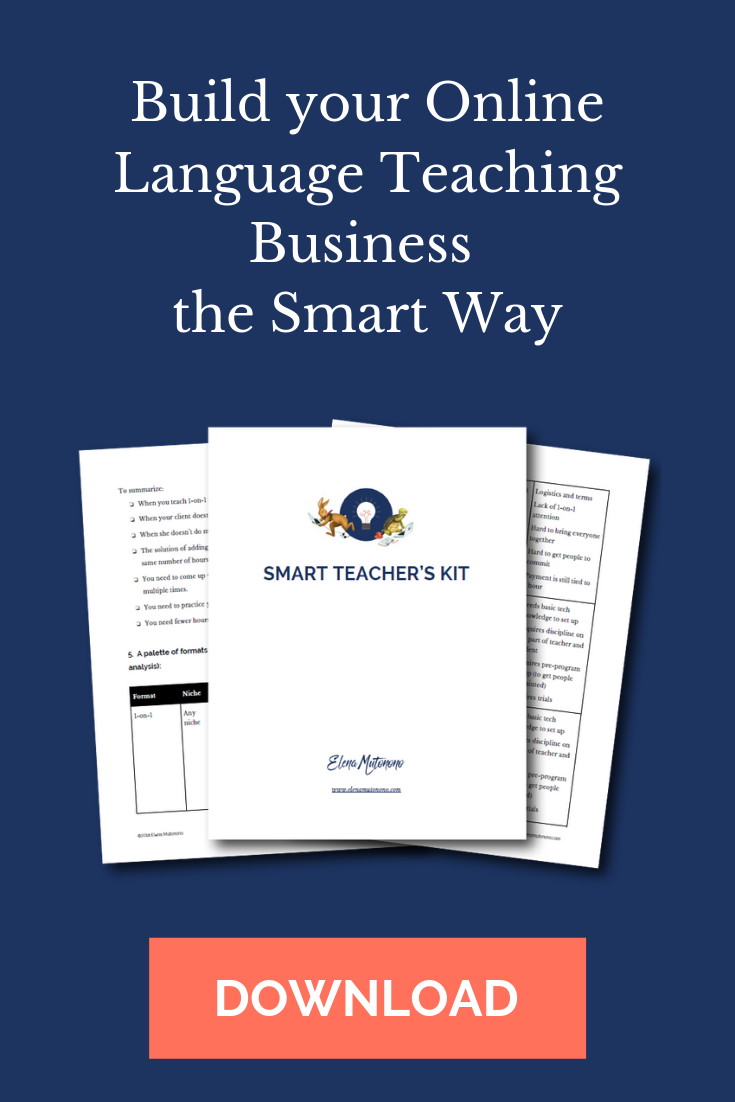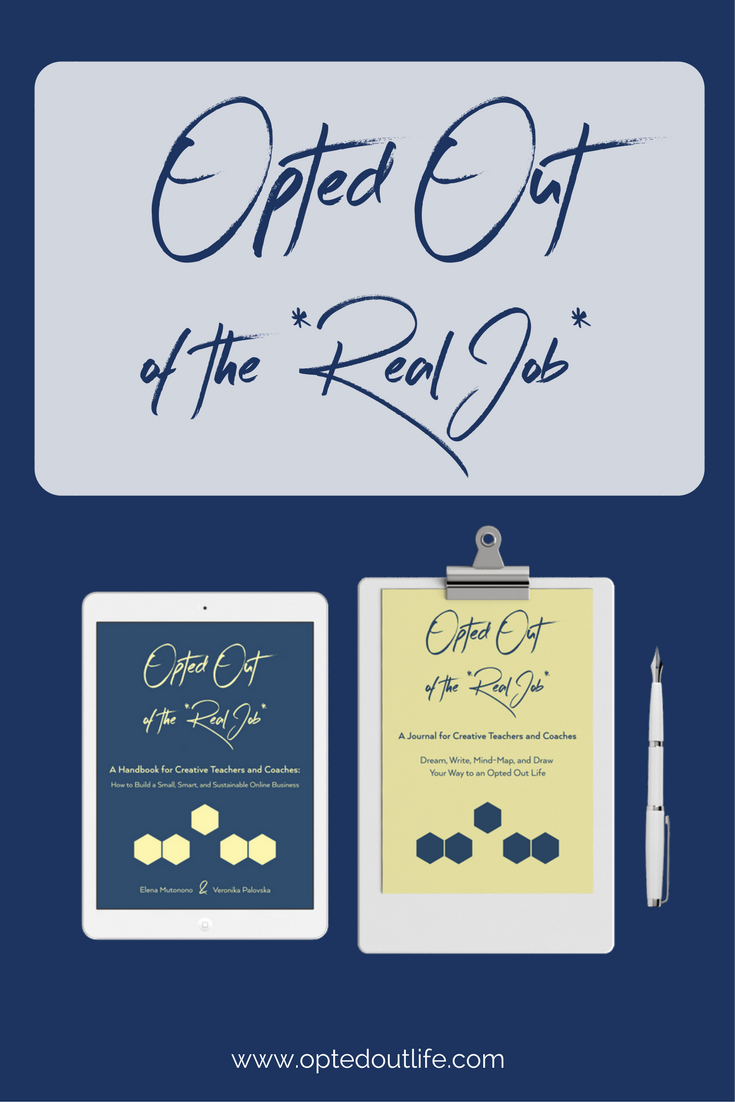Are you struggling to sell more of your online courses? In this post I will walk you through some important tweaks to help you make your courses more sellable.
“I want to create an online course where theater geeks can improve their English by immersing themselves into their favorite plays and musicals,” Denis* tells me. He’s an online English teacher who has a brilliant idea for a niche. He’s enthusiastic and passionate and is ready to create an “epic” online course.
A few days after our session he sends me the rough draft of his syllabus. I open the Google doc and gasp:
I. The role of theater in our world.
II. The most common theatrical genres.
III. The greatest directors and their impact on the world’s theater today.
IV. The language of theater (the 100 words every English learner needs to know).
Each Roman numeral comes with several sub-points. In parenthesis Denis explains that he’ll add 20-minute videos and extensive word lists. Prior to our session he’d spent hours compiling data and watching extra YouTube videos. The course will last 3 months.
He’s confident that this course will help some theater buffs that he’ll target through Facebook ads. His ultimate goal is to turn it into a source of passive income. All he needs from me is to help him sell it.
As I look at the syllabus that is compatible with an in-depth university course, I wonder if I’ll be able to find the right words to say that this will be hard to sell. It’s too overwhelming, not actionable and has little language improvement value to the client. But, like all creatives, Denis struggles with the looming perspective of revamping his course.
(* Denis is a blurry blend of a few clients and my unbridled imagination.)
I have an inkling that this story might be painfully familiar to some of you. Perhaps you’re not a theater buff and this course will never be attractive to you.
But based on my years of experience helping online language teachers work smarter by selling products and courses instead of individual hours, every one of them has, at some point, struggled with creating less.
Reducing content in your online courses will sell them better. Find out how.Click To Tweet
My first online courses used to be exhaustive and overwhelming. It took a lot of mindset work to shift from “I can give them this much” to “What do they really need?” and “If I had only 1 hour to share something really important, what would that be?”
If you struggle with overwhelming yourself and your students this post is for you. Below are my 4 strategies that will help Denis transform his epic course into a manageable one.
#1: Know your audience (more than your subject).
What can Denis do to create a course that will blend language learning and theater experience?
If I were Denis, I would start by observing theater buffs. What makes them tick?
I’d ask them these questions:
-
- What is your one favorite play and why?
- How does it make you feel?
- What do you do before and after you watch a play?
The answers to these questions will give Denis some constraints. Though the plays might be different, there will be similar patterns that he’ll notice.
Theater buffs prepare to see the play. They will also take time after the show to process what they’ve seen. Most theater buffs will love going down rabbit holes of learning about authors, events and history. They learn a lot without feeling burdened by the knowledge.
If Denis pays attention, he will have specific content ideas and course structure ready before he’s done with the interviews.
#2: Define the promise of your course.
Denis’s initial promise is to help his/her clients improve the language through a play/musical. He got carried away a bit by the “theater” part of his mission and his initial syllabus reflected it. “Improving a language” sounds broad and unrealistic.
For Denis’s course to sell well he needs to identify what his clients will work on and in what way their language will improve.
Here’s how I’d help Denis refine his promise from broad to bare bones:
[-] You will take your English to your next level by working on a play or a musical (or whatever you want — I’ll tailor to your needs!).
[+] You will improve your reading and writing by immersing yourself into your favorite play.
[+++] You will activate your spoken English by discussing the 2 most crucial scenes from Sholem Aleichem’s play Fiddler on the Roof.
***
Want to launch a course but are too overwhelmed by the process? Check out my mini-course:
#3: Determine the length of the program.
For a course that Denis had initially envisioned, 3 months was a desirable length. But how realistic is it to keep someone’s attention and motivation burning for that long, despite daily life demands?
To make the course more sellable I recommend shortening it to 3 weeks. Such a short time frame will help him create even more constraints (which shaves off extra):
-
- The participants can’t be any level.
- The participants will only focus on a part of the play.
- The participants will work on bite-sized assignments to solidify a specific skill set.
#4: Make it manageable.
Denis’s initial thoughts of “epicness” are now reduced to a manageable chunk of information. Instead of adding more, he’s focusing on what to take away.
So instead of creating 30-minute videos about the role of theater, Denis’s task is to empower his course participants to work consistently. After all, they will get much more out of a course if they put in 15 minutes daily.
To make them stick to the 15-minute-a-day schedule, Denis does away with humdrum explanatory videos and creates a workbook with daily task checklists.
Denis creates a smart matrix to make his workbook uniform:
1. Read the passage from 1 scene.
2. Pick 10 words and expressions that are new (vaguely new) and use them to summarize the passage. Practice and record yourself. Keep your recording to 1 minute.
3. Reduce the number of words to 5 and summarize the text again. Practice and record yourself. Keep your recording to 1 minute.
4. Take 5 minutes to write the summary down using the same words. How many have you remembered? Use a timer to write for 5 minutes.
5. Rabbit hole bonus: Was Sholem Aleichem married when he wrote this book?
He selects reading passages to make sure they’re easy. The entire “work” doesn’t take longer than 15 minutes, and when the participant feels he/she has accomplished the task well, they’ll reward themselves with the creative “rabbit hole” bonus task. Bingo!
Conclusion
As much as we want to create an epic monstrosity to show off our expertise and validate our many diplomas, a course that sells has to fit into your future client’s lifestyle. As online experts, our strength isn’t in displaying our expertise but using it in a smart way to empower our participants to be experts.
Sell that feeling of “I can do it!” and you won’t need to force your launch on your audience.
What are your thoughts? Which of the strategies makes the most sense to you right now? Let’s chat!
The post was updated in March, 2021.




 Welcome to my nook where *Big Magic* happens. My name is Elena Mutonono, I help small business owners package their services as digital products and sell them online. I want you to work smarter, not harder. Increase your impact beyond your current face-to-face clients. Grow your business as you reach more people all over the world.
Welcome to my nook where *Big Magic* happens. My name is Elena Mutonono, I help small business owners package their services as digital products and sell them online. I want you to work smarter, not harder. Increase your impact beyond your current face-to-face clients. Grow your business as you reach more people all over the world.








I agree. My first course had recordings of questions and answers of 20 to 30 minutes in Spanish, and most of the complaints I heard were: “too repetitive”, “too long”. It’s true what you say: courses need to be short and actionable.
Now, about the promise of the course, I have a question about language learning courses:
A while ago, I made a course promising to master the difference between ser y estar in Spanish (verb to be in Spanish)… it didn’t sell. I thought I had made clear what result my students would get if they took this course: master the difference between these two verbs.
I’ve been doing some research and most popular courses are focused on either language skills or just a couple of them (listening, speaking, reading, and writing), or preparation courses for future tests (i.e. toeic, ielts, etc..)
So my question to you as a language trainer is: do you think courses focused on specific grammar pain points actually sell? or is it better to keep promising improvements to the main components of language just as popular courses?
Hi Diego,
I’m also a teacher and I’m learning Spanish. As your target audience, I wouldn’t buy a course on ser and estar. It seems to me too narrow. Why would I want to pay money if I can watch a youtube video? As a language learner, grammar points are not attractive. I don’t want to master the subjunctive in Spanish. Those words are associated with something difficult and boring. But I do want to imagine myself in the summertime being able to walk into a bar in Spain, order a drink, and have a casual conversation with the bartender. Appealing to the emotions will trigger a better response in my opinion.
Diego, I think if your audience consists of grammar nerds who think, dream, eat and live Grammar then of course such courses will sell. You yourself have to be a Grammar nerd to attract such a crowd. But it seems like this isn’t what your audience wants. The answers of your audience’s wants aren’t on the surface. To help you with selling you need to look inside, not outside. I talk more about it in our upcoming summit (www.bitly.com/teachersummit2019 — are you joining us?) People don’t want the mechanics, the spare parts, the bits and bobs. They want to get into the car and go to their destination. Now some people want a reliable car, others — a cheap one, others — a fast one, others — a brand new one. It’s your job to figure out what your audience wants, but you can’t always do it JUST by asking them. You have to look inside. I’ll close with my favorite quote by Antoine De Saint-Exupery, “If you want to build a ship, don’t drum up people to collect wood, and don’t assign them tasks and work, but rather teach them to long for the endless immensity of the sea.” It might be that you’re not yet clear on what that “endless immensity of the sea” is, but you will get there by looking inside.
Incredible resource here, I’m surprised to have found it this late! I’m binging through content, signed up for email list – thanks Elena. I first stumbled upon the why delete Facebook Groups blog post, super helpful. I’m going to delete both of my Groups and look forward from there.
Hey Fei! Thank you for signing up <3 I responded to your email and looking forward to connecting beyond the list! ~ Elena